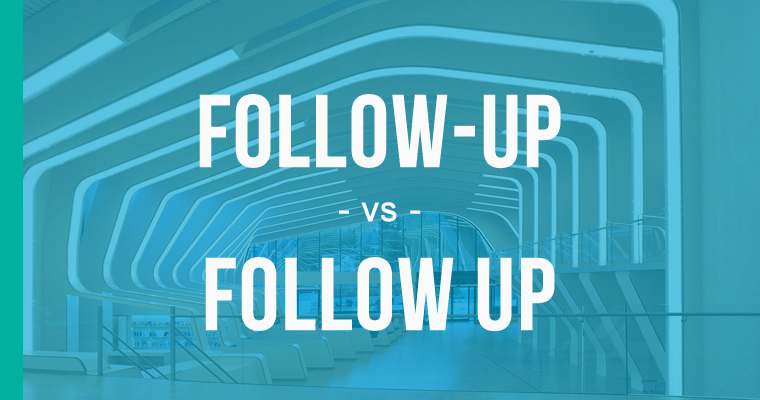Follow-up or Follow up – How to Use Each Correctly

What’s the Difference Between Follow-Up and Follow Up?
Contents
Follow-up and follow up have the same meaning, but they don’t share the same part of speech.
Follow-up can be either a noun or an adjective that refers to a second meeting or other action that follows the first.
- Your first interview went great. We’d like to schedule you for a follow-up interview.
Follow up is a verb that means to pursue a solution closely.
- The reporter followed up on her lead to find the source of corruption.
Let’s practice a few ways you can use these words correctly in English.
Using Follow-Up in a Sentence
When to use follow-up: Follow-up can act as either a noun or an adjective that describes an event or action that is subsequent to a prior event or action.
For example,
- The doctor found some troubling signs during his patient’s physical exam and took some tests. The doctor asked the patient to come back for a follow-up appointment to look into the matter more closely once the tests came back.
- It is common for many companies to schedule interviews with a large pool of applicants, and then only invite the most qualified ones back for a follow-up interview.
Follow-up occurs most frequently in the context of (and collocations with) appointments, discussions, interviews, assessments, reports, studies, question, call, email, or medical procedures.
Using Follow Up in a Sentence
When to use follow up: Follow up, without the hyphen, is a phrasal verb that means to pursue an issue through a subsequent action.
For example:
- The journalist decided to follow up on the rumours by doing some initial investigative work to discover if the claims were true or false.
- The party is tomorrow afternoon but you still haven’t ordered the food. I need you to follow up on that as soon as possible.
To follow up with is another expression that means to check with a person about something. It is common in business contexts as a polite and appropriate way to ask someone to check with someone else about an issue.
Remembering Follow-up vs. Follow Up
The hyphen, or lack thereof, can help you remember which pair of words is the verb and which isn’t.
Follow-up contains a hyphen, which is common with compound adjectives and compound nouns. Other examples include state-of-the-art, on-campus, and sugar-free.
Follow up, however, does not contain a hyphen. This is because it is a phrasal verb. Phrasal verbs should never contain hyphens. Remember that phrasal verbs consist of a main verb followed by a preposition. Some examples include turn on, go up, and sit down.
Outside Examples
- Thomas was also known for 16 holiday season appearances on “Late Night with David Letterman,” during which he’d relate what Letterman called “the single greatest talk show story ever,” about the late “The Lone Ranger” star Clayton Moore. Mr. Thomas and Letterman would then follow-up with a skit during which they would try to knock a giant meatball off the top of a Christmas tree by throwing footballs at the food target (see video below). –Chicago Sun Times
- When McGinley wrote music for “S-Town,” the popular follow-up to “Serial” about the residents of a town in Alabama, he knew more about the content and characters than he ever does for “This American Life.” –LA Times
- North Korea successfully tested the submarine-launched Pukguksong-1 in August last year. It then followed up with a successful test of the land-based Pukguksong-2 in February this year. Both are believed to have intermediate ranges that could target Japan and the U.S. bases there but not the mainland United States. –New York Daily News
- Chelsea, which beat Tottenham at its temporary home for the season last Sunday, followed up with a 2-0 victory over Everton as the champions showed they have quickly recovered from a shock opening-day loss to Burnley. –USA Today
Quiz: Follow Up vs. Follow-up
Instructions: Fill in the blank with the correct word, either follow up or follow-up, in the correct form.
- It is standard operating procedure to schedule a _________________ appointment after such a serious surgery.
- I hate to ask you to ________________ on this issue, but Clara needs some help with it.
- A good detective always _________________ on all the clues in a case.
- Thank you for your presentation! Do you mind if I ask you a few ____________ questions?
See answers below.
Article Summary
Should I use follow-up or follow up? These both have the same meaning relating to a subsequent activity, but they are different parts of speech.
- Follow-up has a hyphen because it can act as either a compound noun or adjective. It describes a subsequent activity, usually an appointment or interview.
- Follow up has no hyphen because it is a phrasal verb. It refers to the action of doing a subsequent activity.
Be careful to use the hyphen only when appropriate to show the correct part of speech.
Answers from Quiz
- follow-up
- follow up
- follows up
- follow-up
